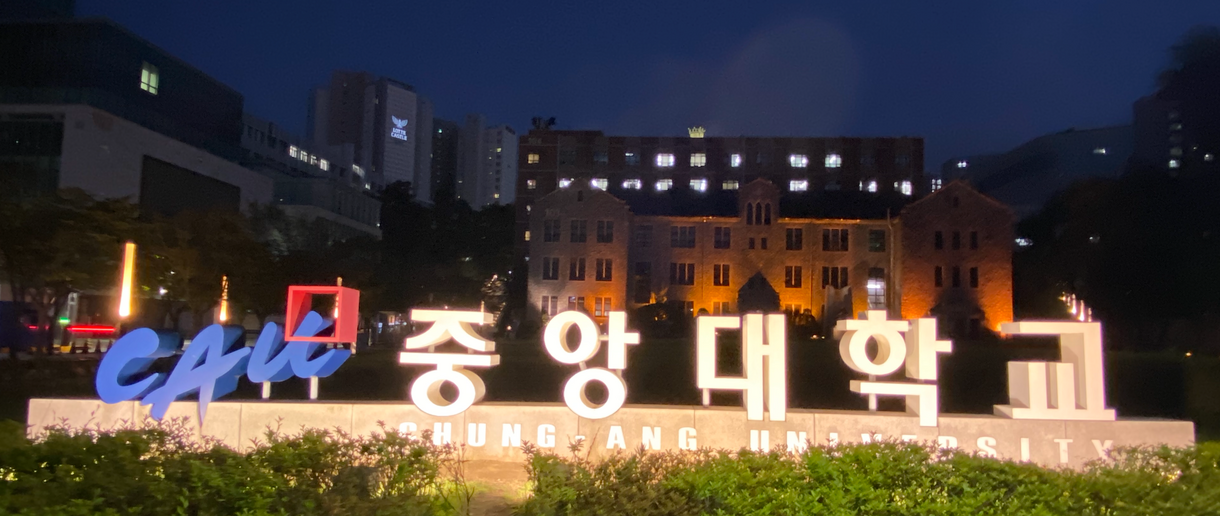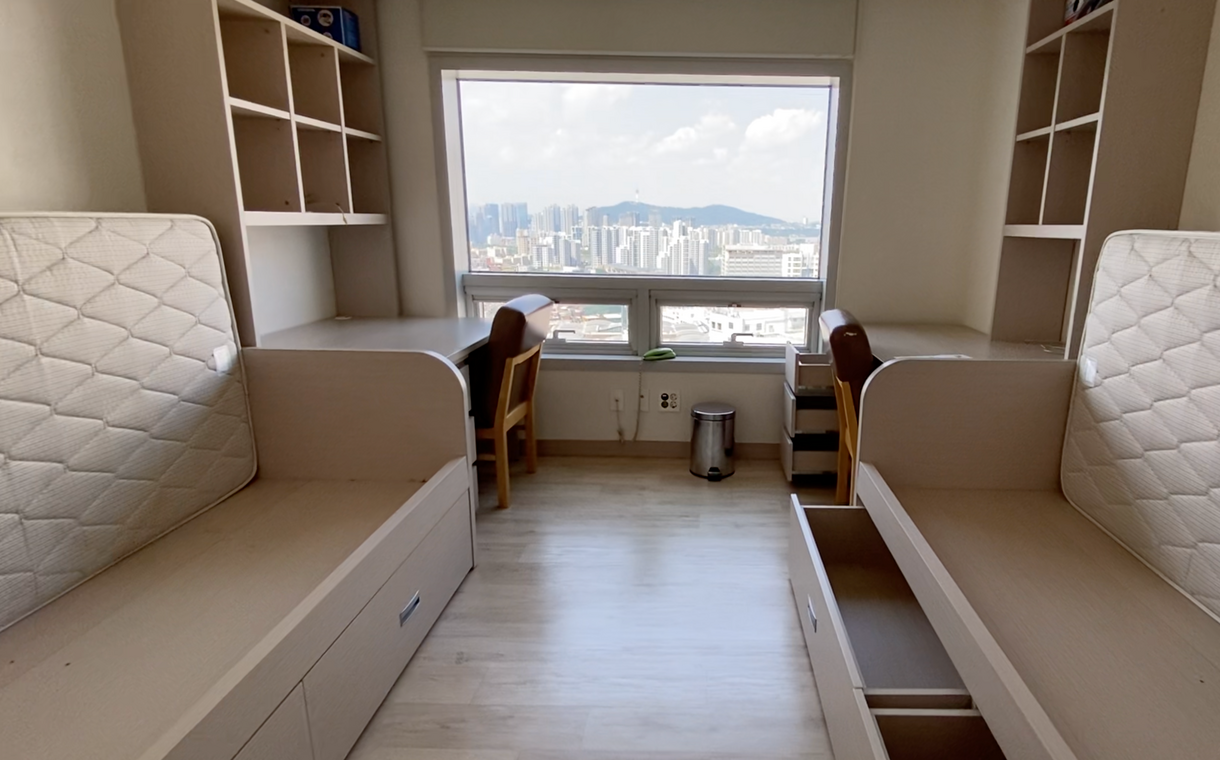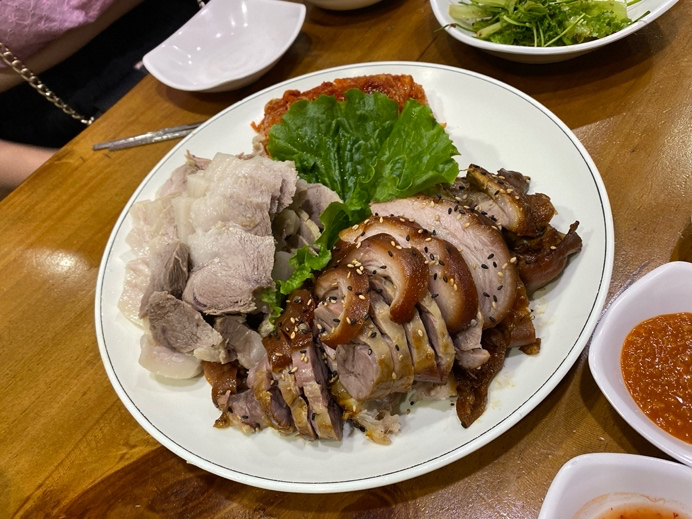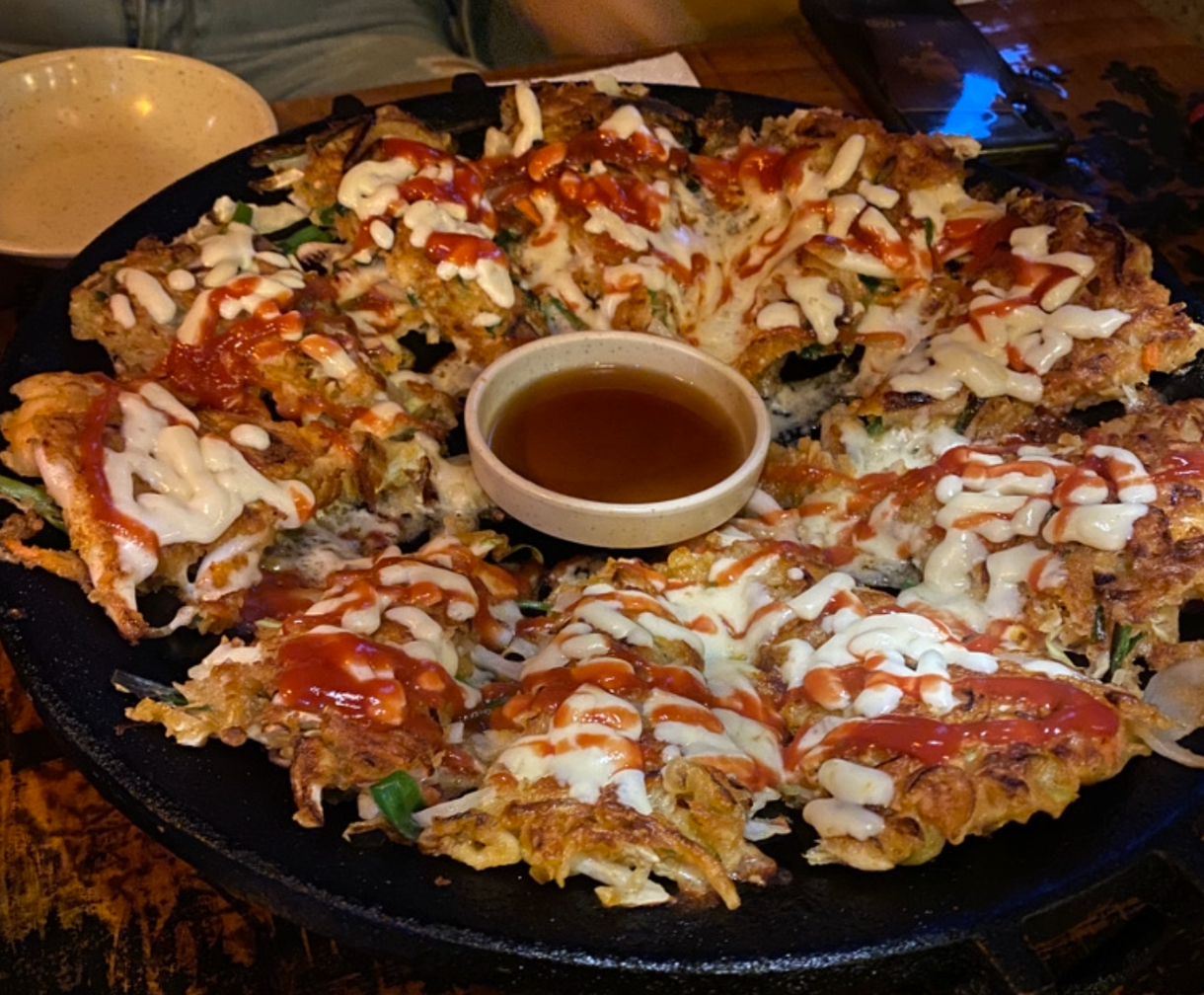Chung-Ang University SS21 Jana L.
Hello everybody!
As my last semester in my Master's program, I had the chance to spend the time in South Korea at Chung-Ang University (CAU) in Seoul. It was a dream of mine to travel to South Korea, as I have always been fascinated by the culture and the food, so I was very happy that the University of Duisburg-Essen, offered a partner university directly in Seoul.
Preparation
I got information about the CAU through the organization IS:link and through my own internet research. The application phase at the CAU began on November 6, 2020. After the successful application, we gradually received more information about the stay and for the preparation for the semester abroad. For a semester abroad in South Korea you need the student visa (D-2), with the following documents: application form with "Approval Number "Confirmation of Visa Issuance", 1 passport photo, passport (valid for at least 6 months) and the CAU Business Certificate. Together with these documents I went to the Korean Embassy in Bonn, and after less than two weeks I was able to access the visa online and print it out. The visa is free of charge for German citizens. Afterwards, I booked my flight via Asiana Airlines (about 700€ for a round trip). For the semester abroad in South Korea at the CAU you need an English level of B2. For South Korea, my family doctor did not recommend any important vaccinations if you are staying in urban areas. Very important is the international health insurance. I took out my international health insurance for about 170€ with Hanse Merkur. After arriving in South Korea, the Korean government has provided another NHIS health insurance for foreigners. However, I was able to get exempted from the Korean NHIS health insurance with my Hanse Merkur international health insurance. Before the semester in South Korea began, I submitted my Learning Agreement. However, it took a very long time to process the Learning Agreement. One month before the end of the semester abroad, I only received all signatures for the Learning Agreement.
Arrival
Arriving in South Korea under Covid-19 conditions was very special. First, you had to show a negative PCR test before flying to South Korea. Then upon arrival in South Korea, after all the official processes at the airport, one had to go to a health center or hospital to take a PCR test. If the PCR test is negative, one can do the 14-day quarantine in a self-selected unit. If the PCR test is positive, one is taken to a Korean government quarantine unit to do the 14-day quarantine. Fortunately, I was negative, and was allowed to do the quarantine in the CAU dorm. I paid about 300€ for the quarantine stay in the dorm. We got our meals every day at three fixed times. After the 14-day quarantine, we had to do another PCR test. My PCR test was negative, so I was allowed to leave the quarantine. During my entire stay in South Korea, there was a strict 4-person rule, meaning you could not meet with more than 4 people to prevent Covid-19 spread.
Studying at the CAU
Then, at the beginning of March, the semester began. All courses were conducted online. Course selection was divided into 3 phases. The first and most important course selection was in January 2021 - first-come-first-served basis. Since I am a master's student, the rush for courses was not that high. As an undergraduate student, there is more competition for courses. I registered for two courses, (1) International Development and (2) Elementary Korean Language. International Development was completely live, allowing interaction with the professor. Elementary Korean Language was divided into two learning methods: (1) uploaded videos and homework with set deadline, (2) live videos with interaction. The professors were always very helpful. You could communicate with them by email or by Kakaotalk (Korean Whatsapp), and they always responded very quickly and kindly. Unfortunately, you couldn't get to know all of your fellow students because many didn't live on campus and the courses were all conducted online. The exams were also all done online. It depends on the professor how the exam method was. For International Development, I had a final presentation and a take-home exam, and for Elementary Korean Language, I had two oral exams. Depending on the professor, there are still mid-term exams and weekly submissions and homework during the semester. We received a CAU student ID card a month later after the semester started. Compared to Germany, campus life in South Korea is really cool. You actually have everything you need on campus, e.g. bank, restaurants, hairdresser, convenience stores. However, not all buildings were accessible because of Covid-19. CAU had a large central library. Using an app and the student ID card, you could reserve a spot in the library. For my stay in South Korea, I decided to stay in a dorm because it was a cheap and comfortable option for me. For 4 months I paid about 1250€. For the dorm you had to apply in advance - first-come-first-serve basis. CAU has two buildings 308 and 309 that are used as dorms, and are each divided into men's and women's areas. Due to Covid-19, everyone had their own room, which was very convenient. The room is divided into two sides with a desk and a bed on each side. There are two closets and a shoe closet. There is also an integrated bathroom with a shower, sink and toilet. Unfortunately, there was no kitchen in the dorm, only one common room per floor with a water dispenser (hot/cold/ice), microwave, freezer, refrigerator and iron with ironing board. There were also monthly inspections and disinfections of the room. There was also a curfew between 1-5am. Despite these restrictions, it was a very good decision to have lived in the dorm because it allowed for quicker contact with other exchange students. However, it was not very easy to get to know Korean students because they were not always willing to communicate in English. Besides the courses, there was the possibility to apply for extracurricular activities. I decided to join the Korea Club. This is where you organize a meeting every two weeks with two Korean CAU students and another exchange student to experience different activities together.
Everyday life in Seoul
The cost of living in South Korea is lower than in Germany. Due to the fact that I lived in a dorm and there is no kitchen, I always ate in restaurants. An alternative option would be to eat in the cafeteria. However, the prices in restaurants are sometimes identical to those in the cafeteria, and you have more choice. Food in South Korea is comparatively cheaper than in Germany. The average price for a normal meal in South Korea is about 5€ for a normal meal. You can always get water for free. Drugstore products, however, are quite expensive in South Korea, e.g. at stores like Olive Young or Lalalove. However, there is a store called Daiso near the CAU campus to stock up on everyday items and basic drugstore products at a reasonable price. A SIM card in South Korea is very important. Unfortunately, I made the mistake of buying a Korean SIM card in Germany through Amazon for 10€. It is not worth it at all. Near CAU there is a store called Chingu Mobile where you can get a very good deal for a Korean SIM card with unlimited calling, texting and internet for 4 months for about 30€. As a foreigner in South Korea you have some restrictions in everyday life, especially before you get the ID card (Alien Registration Card ARC, also Residence Card). Only after that you can use services like online banking, online shopping and the QR check-in. Due to Covid-19, one has to leave their data (phone number, place of residence) or scan a QR code before every stay in the restaurant. However, this QR code is only available with the ID card. In South Korea, the platforms: Naver (similar to Google), Naver Maps (similar to Google Maps), Papago (similar to Google Translator) and Kakaotalk (similar to Whatsapp). Basically, Korean people's English skills are only adequate. Many don't even understand basic words in English. If you travel to South Korea, be prepared to speak broken Korean-English, speak Korean, or despair trying to speak English with people. However, most Korean people are very polite and helpful, and usually try to help anyway, even though communication is not so good. In South Korea, people bow to each other when greeting and saying goodbye. The Korean drinking culture is very noticeable in this regard. Korean people like to drink a lot of soju and beer - especially when eating. Korean food is very delicious. Examples of Korean food are: Korean BBQ, Tteokbokki, Pajeon, various soups, Bossam and Jokbal. At the same time, the food is usually spicy and a bit greasier than other Asian cuisines.
Leisure activities in South Korea
Leisure activities in South Korea, and especially in Seoul, are varied. There are activities such as arcade centers, billiards, bars, karaoke, shopping, screen golf and more. In addition, the activities are not as expensive as in Germany. Even though CAU is located in Seoul, the Dongjak-gu area doesn't offer much. However, what is very cool in the area is to go jogging or walking near the Han River, or even biking or picnicking. For other leisure activities, you can take the bus or Subway to other parts of the city. Well-known neighborhoods include:
- Hongdae: student district with many leisure activities
- Itaewon: Party district with many bars and restaurants (here you can find kebab)
- Gangnam: Rich district with many bars, restaurants and shopping possibilities
To travel by bus and train, you need a T-Money Card. The T-Money Card is a rechargeable transportation card. You can buy a blank card with different designs in drugstores, supermarkets or convenience stores for about 2€, and then you have to constantly recharge it to use bus and subway. Unfortunately, due to Covid-19, you couldn't travel outside of South Korea, which was a shame. However, it is also very possible to travel within South Korea, for example to the second largest city in South Korea Busan or to Jeju Island. Other small destinations are also Daegu and Gyeongju. In addition, South Korea offers many opportunities for hiking. Well-known hiking destinations include Bukhansan, Gwanaksan, Seoroksan. The highest mountain in Korea Hallasan is located on Jeju Island.
Personal experience and evaluation of the stay
I am very glad that I had the opportunity to do a semester abroad at Chung-Ang University in Seoul. It was a very cool time where I gained a lot of great experiences and made new friends, even during the Covid-19 pandemic. I was able to improve my English skills by constantly communicating in English, but I was also able to learn Korean. Studying at Chung-Ang University gave me an insight into the Korean education system. As my first experience abroad and first longer trip away from home, I would say I learned to become more independent and responsible, as well as more open and confident with new people. Basically, I would say that living in Seoul is very pleasant and exciting, and as a German person you don't suffer from culture shock than compared to other big cities in Asia. The only difficulty can be the communication with Korean people, because the English level is only sufficient. I recommend a semester abroad to every person if it is financially and time wise possible. Thereby, South Korea and Seoul offer unique conditions for a stay abroad. I am very happy that I was able to complete my last semester in the master's program this way. For this unique experience, I would like to thank the IS:link organization at the University of Duisburg-Essen, through which the semester abroad was made possible. Furthermore, I am incredibly grateful for the financial support through the PROMOS scholarship, through which I had a very nice stay in South Korea and hardly had to bear any financial problems before and during the semester abroad.
Jana L.





![[Translate to English:] [Translate to English:]](/fileadmin/fileupload/PRO-ISLINK/postApril_ISlink_Logo_IS_Student_Exchange_Network.png)